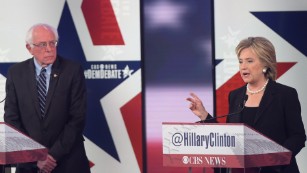CNN/ORC poll: In Democratic race, Clinton solidifies lead
In a Democratic field that has winnowed to just three candidates, Hillary Clinton has regained a dominant lead over Vermont Sen. Bernie Sanders, topping him by a 28-point margin, her widest in CNN/ORC polling since July.
Clinton leads Sanders 58% to 30%, with former Maryland Gov. Martin O'Malley registering just 2%, according to a CNN/ORC Poll released Friday.
New CNN/ORC Poll: Full results for 2016 Democrats
The poll finds Clinton widely seen as better able to handle matters of foreign policy than Sanders, an advantage that has likely helped the former secretary of state as global affairs and national security have gained prominence in the presidential campaign. Broad majorities of Democratic voters report that they trust Clinton most on foreign policy (74%) and handling ISIS (59%), and as best able to handle the responsibilities that come with being commander-in-chief (64%).
RELATED: CNN/ORC Poll: Trump alone at the top again
The poll, conducted after the terrorist attack in Paris but before Wednesday's shooting in San Bernardino, California, finds that nearly three-quarters of Democrats now consider foreign policy extremely or very important to their vote, up from 64% in early September. Terrorism has also gained in importance, from 72% considering it extremely or very important in September to 79% now.
The increased attention to foreign policy has not diminished Democratic voters' focus on the economy, however, with 85% saying that's a key issue, about the same as in September.
While Clinton tops Sanders as better able to handle economic issues (58% to 31%), the two are about even when voters are asked who would do the most to help the middle class (47% say Clinton would, 44% Sanders).
That erosion in Clinton's wide edge on handling the economy when the question is instead framed about the middle class is centered among a handful of groups: White voters (55% trust Clinton most on the economy, while just 40% think she would do the most to help the middle class), those with college degrees (55% trust Clinton on the economy, just 38% on helping the middle class), and liberals (53% trust Clinton on the economy, 34% on helping the middle class). Among those Democratic voters who call the economy "extremely important" to their vote for president, however, Clinton holds wide leads over Sanders on both questions: 68% to 24% on who would best handle the economy, 53% to 40% on who would best help the middle class.
In the last CNN/ORC Poll, conducted in mid-October just after the first Democratic debate, the field of Democratic candidates was larger and it included the possibility that Vice President Joe Biden would join. Besides Biden, the polling also included former Rhode Island governor Lincoln Chafee, Harvard professor Larry Lessig and former Virginia senator Jim Webb.
All have since announced that they are not running for president or have suspended their campaigns.
That October poll testing the larger Democratic field found Clinton with a 45% to 29% lead over Sanders, suggesting the shrinking field has primarily benefited Clinton -- up 13 points -- while doing little to boost Sanders' numbers -- up 1 point.
Notably, Clinton has gained ground among several groups where Sanders had made inroads.
In the October poll, Clinton and Sanders ran nearly evenly among voters under age 55 (42% Clinton to 37% Sanders), liberal voters (43% Clinton to 37% Sanders) and independents who lean toward the Democratic Party (41% Clinton to 37% Sanders).
In the new poll with the slimmed-down field, Clinton posts leads among each of those groups, topping Sanders 48% to 39% among those under age 55, 52% to 42% among liberals, and 48% to 40% among independents who lean toward the Democratic Party.
The CNN/ORC Poll was conducted by telephone November 27 through December 1 among a random national sample of 1,020 adults. Interviews were conducted with 930 registered voters, including 403 who are Democrats or independents who lean toward the Democratic Party. For results among Democrats and Democratic-leaning voters, the margin of sampling error is plus or minus 5 percentage points.
News Courtesy: www.cnn.com












